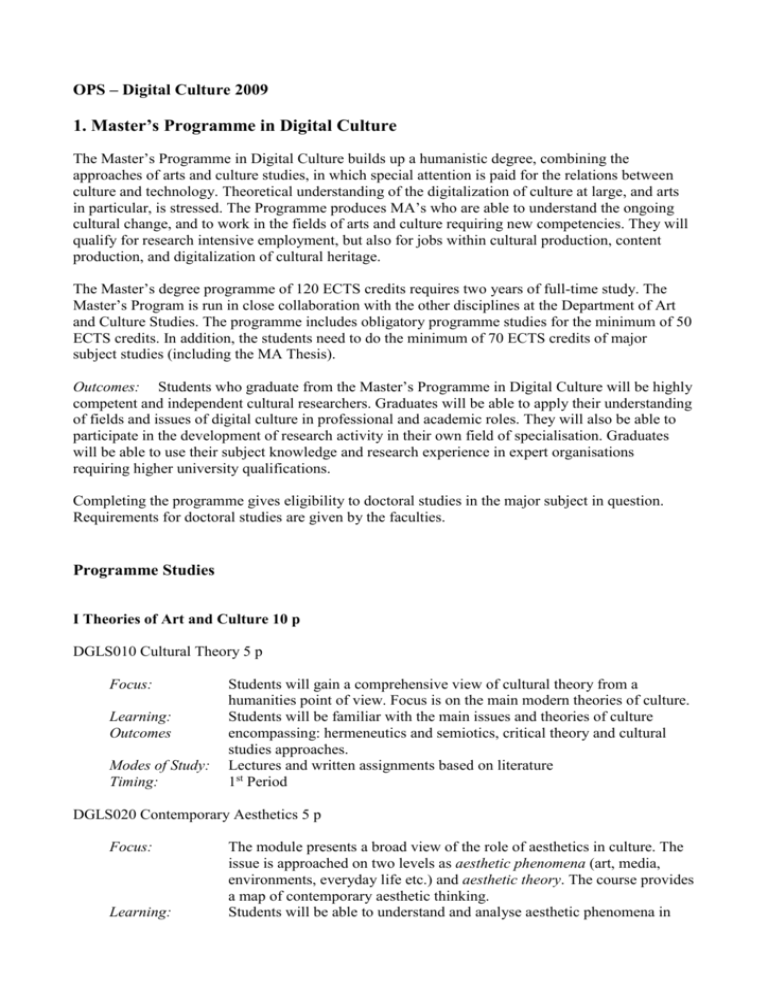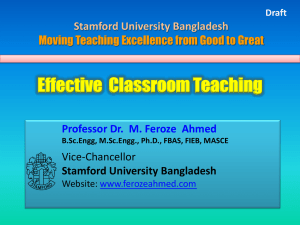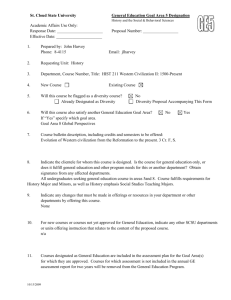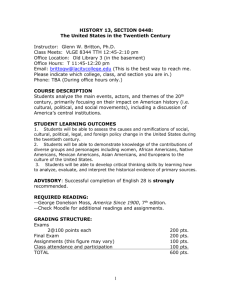1. Master`s Programme in Digital Culture
advertisement

OPS – Digital Culture 2009 1. Master’s Programme in Digital Culture The Master’s Programme in Digital Culture builds up a humanistic degree, combining the approaches of arts and culture studies, in which special attention is paid for the relations between culture and technology. Theoretical understanding of the digitalization of culture at large, and arts in particular, is stressed. The Programme produces MA’s who are able to understand the ongoing cultural change, and to work in the fields of arts and culture requiring new competencies. They will qualify for research intensive employment, but also for jobs within cultural production, content production, and digitalization of cultural heritage. The Master’s degree programme of 120 ECTS credits requires two years of full-time study. The Master’s Program is run in close collaboration with the other disciplines at the Department of Art and Culture Studies. The programme includes obligatory programme studies for the minimum of 50 ECTS credits. In addition, the students need to do the minimum of 70 ECTS credits of major subject studies (including the MA Thesis). Outcomes: Students who graduate from the Master’s Programme in Digital Culture will be highly competent and independent cultural researchers. Graduates will be able to apply their understanding of fields and issues of digital culture in professional and academic roles. They will also be able to participate in the development of research activity in their own field of specialisation. Graduates will be able to use their subject knowledge and research experience in expert organisations requiring higher university qualifications. Completing the programme gives eligibility to doctoral studies in the major subject in question. Requirements for doctoral studies are given by the faculties. Programme Studies I Theories of Art and Culture 10 p DGLS010 Cultural Theory 5 p Focus: Learning: Outcomes Modes of Study: Timing: Students will gain a comprehensive view of cultural theory from a humanities point of view. Focus is on the main modern theories of culture. Students will be familiar with the main issues and theories of culture encompassing: hermeneutics and semiotics, critical theory and cultural studies approaches. Lectures and written assignments based on literature 1st Period DGLS020 Contemporary Aesthetics 5 p Focus: Learning: The module presents a broad view of the role of aesthetics in culture. The issue is approached on two levels as aesthetic phenomena (art, media, environments, everyday life etc.) and aesthetic theory. The course provides a map of contemporary aesthetic thinking. Students will be able to understand and analyse aesthetic phenomena in Outcomes Modes of Study: Timing: various contexts and in relation to questions of value, ethics, ideology and power. Lectures and written assignments based on literature 3rd Period II Cultural Technologies 15p DGLS030 Art & Visual Culture 5 p Focus: Learning: Outcomes Modes of Study: Timing: This course provides a comprehensive view of contemporary visual art in relation to its context. Special emphasis is placed on photographic and media art, and media representations. Students will understand the multi-layered relations of elements of visual culture. They will possess the ability to critically analyse examples and then express their findings in written form. Lectures, Assignments, Literature 2nd Period DGLS040 Media Culture 5 p Focus: Learning: Outcomes Timing: This is an introduction to studies of media culture and theorisations of new media. The module addresses media culture in terms of production, distribution and reception, and with specific attention on the questions of consumerism, genre, fandom and intermediality. Students will possess the ability to recognise varied issues and perspectives in the study of media culture from a humanities perspective. They will be able to critically evaluate media representations. 2nd Period DGLS050 Nordic Heritage & Digital Technology 5 p Focus: Learning: Outcomes Modes of Study: Timing: This integrated module addresses some main features of Nordic heritage and major approaches in using digital technology to preserve and access cultural heritage. Issues such as online museums, digital archives, and humanities computing will be discussed in connection to cases taken from Nordic cultural history. Students will know the main roles of memory institutions, and will be able to see the potential of digital cultural heritage in relation to presentation, preservation and reception. Lectures, Assignments, Literature 4th Period III Research Practices 10 p DGLS060 Visual & Textual Analysis 5 p Focus: The focus of this module is the analysis of visual and textual materials and cultural texts, including literary texts, media texts, visual materials, etc. Learning: Outcomes Modes of Study: Timing: The objective is to attain an overview and understanding of various methods and their possibilities and limits in doing research. Students will be able to conduct analysis on various types of cultural products. They will also possess the ability to present findings in a written form. Lectures and/ or written assignments based on literature and/ or book Exams 3rd Period DGLS070 Academic Research Practices 5 p Focus: Learning: Outcomes Modes of Study: Timing: The aim of the course is to familiarise students with different theories and research methodologies through ongoing research, projects and case studies. The course introduces practices of conducting research and addresses the role of researchers in the academic community. Students will know how to identify various research practices and methods in the digital cultural field. Students will then be able to implement the studied methods in their own research samples. Lectures and individual assignment based on literature 4th Period IV Expertise 5-9 p Focus: Learning: Outcomes Modes of Study: The module consists of specialisation on a specific theme within arts and cultural studies. These may include advanced level studies: literature and individual assignments, courses, projects, seminars, conferences, visiting lectures and/or a traineeship. Students will gain deeper and up-to-date insight of the issues relating to their area of specialisation. Participating in a seminar, conference or the equivalent, visiting lectures (lecture pass), a traineeship or work in a project, including a written report; a set book exam or essays based on literature. Alternative modes possible and to be discussed with your teacher. Major Subject Studies DGLS080 Seminar 10 p Focus: Learning: Outcomes Getting familiar with the scientific practices and discourses. The seminar includes assignments such as a literature review within the thesis area; a disposition for the thesis; research plan; oral and written presentations; taking the role of the opponent; popularization of research. Active participation in the seminar discussions is required. Students will be able to plan and conduct research work. They will be competent in effectively engaging in academic discussion and argumentation. Modes of study: Timing: Seminar sessions, presentations, assignments 3rd Period and 4th period, and 2nd year (1st period and 2nd period) Master’s Thesis 40 p Focus: Learning: Outcomes Modes of study: Timing: Master’s thesis about a topic related to Digital Culture. Students will be competent in conducting independent research work based on a decided and agreed research question. They will also be able to coherently present their findings in a professional academic written form. Additionally, students will gain an expert understanding of knowledge in their field of specialisation. Individual work and personal supervision by programme staff (two supervisors for each student) 2nd year Advanced Studies in Major Subject DGLS320 Theories of Digital Culture 5 p Focus: Learning: Outcomes To understand the specific nature of digital culture on a conceptual level and the digitalization process as a part of cultural change. The course will consist of an overview of the theories of digital culture. Students will be familiar with the classic texts within the digital culture field. DGLS410 Digital Arts 5 p Focus: Learning: Outcomes Special emphasis is placed on new digital art phenomena often situated between the boundaries of disciplines, which are not readily classified by traditional art genres. Students will be able to recognise and evaluate different forms and movements in the fields of digital art. DGLS220 Methodological Issues in Internet Research 5 p Focus: Learning: Outcomes The course introduces different approaches to methodology within Internet research and addresses ethical questions involved with interdisciplinary research. Students will capable of critically examining and evaluating methods used for analysing various forms of internet research data. Special consideration is given regarding ethics, relevance, appropriateness and usage of data. DGLS471 Game Studies 5 p Focus: Learning: Outcomes This is an introduction to the new academic research field of games studies, or ludology, and its basic concepts and approaches. Students will be proficient in situating games within the context of the media landscape. They will be able to analyse games and gaming experience from a ludological perspective. DGLS441 Digital Literature Focus: Learning: Outcomes This course introduces students to the central theories of digital literature, cybertextuality and hypertext theory. Students will be familiarised with genres of digital literature such as hypertext novels, interactive poetry, web fiction etc. Students will be able to recognise and evaluate different forms and movements in the fields of digital literature. DGLS461 Information Graphics Focus: Learning: Outcomes The purpose of this course is to take an historical approach to different uses of information graphics in the media, and to discuss the varying quality of visuals in specific genres. Students will understand the active use of graphics and how it relates to the design and contents of visual communication. They will also be able to identify and separate genres from an historical perspective. DGLS480 Participatory Cultures Focus: Learning: Outcomes This course provides an introduction to theories and definitions of online communities from Usenet groups to social network applications. Themes for individual sessions include meanings of the virtual; the crafting of identities; self-representation; sociability and commercialisation. Students will recognise the cultural conditions and implications influenced by online participatory domains.






